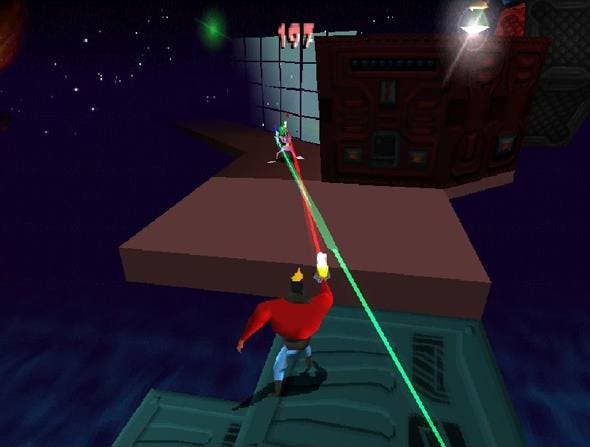The life and times of Dylan Cuthbert
The Q-Games boss on infiltrating Nintendo EAD, jumping ship to Sony and going solo with PixelJunk.
He returned to Japan in 1999 to work at Sony Japan on tech demos for what would become the PlayStation 2 (the duck/bath clip shown at E3 2000 was Cuthbert's work), before finally taking the leap and setting up Q-Games in 2001.
Its first few years were spent staffing up and working on more tech demos, this time for Sony's PSP and the nascent PS3, and it wasn't until 2006 that its first game - stylish GBA puzzler Digidrive (later remade for DSiWare as Art Style: Intersect) saw release. Another Nintendo collaboration, Star Fox Command, followed soon after, alongside work on aspects of the PlayStation 3's XMB, before development on the first PixelJunk title got underway.
Since then, it's become one of the most prolific studios in the business, turning out on average three titles a year, alternating between bite-sized DSiWare downloads for Nintendo and six more PixelJunk titles for Sony, with Sidescroller and 4am (formerly known as Lifelike) the next out the door.
"We go with whatever we see that looks interesting and fun, without really caring if the market is there," he explains of Q's ethos. "As long as we make enough money to get by we're fine. It's more fun just being able to make what you want to make."
It's a unique set-up: a Japanese studio run by a Brit, staffed by a mix of developers from both East and West, and making exclusive titles for two opposing platform holders.
"If you're a Japanese person coming in you'll probably think it's very Western, and if you're a Western person you'll probably think it's very Japanese," says Cuthbert of the office culture. "It really is like that. It has a bit of everything."
And that dichotomy is clearly reflected in the games it makes. While its output might be aimed more at the Western market, its titles are built on solid Japanese design principles.
"They're kind of like a hybrid. Some of the art styles are Western but a lot of the gameplay elements are Japanese. So, for example, PixelJunk shooter has a lot of Nintendo touches to it. Like a Super Mario World thing - secret areas and coins to collect.
"And our attention to detail is definitely more on the Japanese side. We just make sure everything is very finely tuned. It creates that very nice hybrid between Western and Japanese aesthetics."

With feet placed firmly on both sides of the globe, Cuthbert has a privileged vantage point from which to survey the health of his adopted homeland's games industry. Just a few steps from the café in which we meet, the Tokyo Game Show is underway and it's a rather sorry sight this year, barely filling two thirds of the Makuhari Messe. While there are a handful of interesting titles on show, the majority are sequels or spin-offs of established franchises.
"It's kind of in a weird state because you've got two consoles in their final years - the Wii and the PSP - so we're in that lull," he muses.
"Looking around the show today, it seems the publishers are getting a bit weak-willed. They're not really claiming their territory very well. There's a lot of sequels, and nothing that makes you go 'wow'.
"Back in the day, when you came to the Tokyo Game Show there'd be things like Katamari Damacy out of left field to wake you up a bit. Or there'd be weird Korean bottom probing games or something, but at least it was different. This year I haven't seen anything that's interesting.
"I don't know what might shake things up again," he continues. "I don't know many studios that do the kind of thing we do where we publish and self-fund our own titles. Most studios are still in the old model where you have to be funded by the publisher and the publisher tells you everything you have to do. They do the work, and that's it. But the publishers aren't really taking the risks right now."
He goes on to suggest that the country's burgeoning mobile sector has slowly been robbing the core Japanese games industry of young talent.








